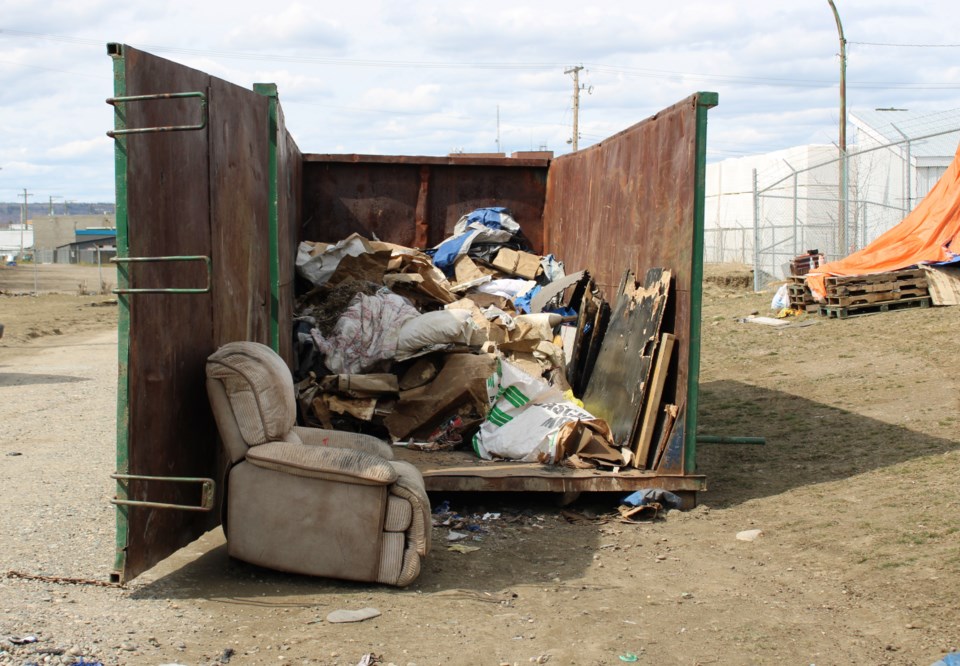City council gave staff the go-ahead Monday, Aug. 19 to find ways to rid the downtown of refuse that could be used as fuel for fires.
Options to be looked at include finding ways to encourage business to screen their dumpsters and reduce the buildup of cardboard, pallets and tires with the help of frequent pickup and recycling programs and, in the case of derelict vehicles, an event to remove them.
The proposals follow on a series of 10 overnight patrols, each made up of a bylaw enforcement officer and a firefighter, conducted between May 18 and June 18. Prince George RCMP did not participate due to staffing issues.
In all, the patrols came across 58 fires. Most were small and being used for warmth and were easy to put out but did leave some marks and damage, bylaw service manager Charlotte Peters told council.
"What we were interested in mostly though was the fuel for the fires which was in most instances garbage - pallets that had been left in the downtown or cardboard," Peters said and mentioned in her report to council that the materials were found in open, unsecured garbage dumpsters or stored in the alleys behind businesses.
"It was also reported during the patrols that pallets are being regularly dropped off at the LPBE (Lower Patricia Boulevard Encampment) to be used in making shelters or fuel for fire," Peters said. "It is not known who provides those pallets to the encampment."
The patrols came across 93 dumpsters with very few secured.
Peters suggested addressing the problem could involve working with Downtown Prince George to establish a recycling program to take care of the cardboard and reduce the number of dumpsters in the downtown and the number being left open.
"I don't think this is something we can solve overnight but I think we can do some research into finding out what we can do about screening in dumpsters that are downtown," Peters added. "I know it would be an expense for businesses and I think perhaps and I think there is perhaps some research that could be done into revenue streams that could potentially help business into doing something like that.
"Perhaps there is a program that we could plug into in terms of getting rid of some of the pallets that are getting left around. Lots of the stores downtown have goods that are being brought in on pallets and the pallets are simply being left out back. All those pallets end up either in the encampment as fuel for these fires or on the street as fuel for these fires."
Rearranging the dumpsters and cleaning up the areas behind some of the businesses would also solve some of the parking issues, Peters added.
The patrols came across 45-60 people each night, usually in groups of three or four. Most said they were from Prince George with a small number from elsewhere in northern B.C.
"We asked them sort of point blank 'why aren't you in Lower Patricia? Why aren't you in a shelter?' And the answers we got were consistent through the entire series of patrols," Peters told council.
"If they weren't at Lower Patricia, it was essentially because of the criminality that was taking place down there. If they weren't in shelters it was because they had been banned or they had been too late to get into the shelter."
On that note, Peters said staff will work with BC Housing to find out why so many had been banned from the shelters. Peters predicted it will be a matter of "a training issue with people who are working within the shelters" and that the mental health issues some of the people out on the street "are far beyond the capacity of the people who are working in the shelters to deal with."
They most commonly congregated around The Northern Health Overdose Prevention at 277 George St., the AWAC Shelter at 144 George St., St. Vincent DePaul at 1220 2nd Ave., Northern Hardware at 1386 3rd Ave., POUNDS at 1126 3rd Ave. and the Civic Plaza at 808 Canada Games Way.
Peters said the patrols were a worthwhile exercise.
"I don't think we learned any surprises," Peters told council. "But up until we did this series of overnight patrols, all the information we had was anecdotal. This gave us an opportunity to see what was happening on the streets of Prince George through the night and gave us an opportunity to talk to some of the folks who were on the street through the night and listen to some of their thoughts on what could be done going forward."
Timelines for following up on the tasks were not provided "as these are viewed as large undertakings and the recommendations are only seeking to have them built into the upcoming work plans at this time," administrative services director Eric Depanau told council.



